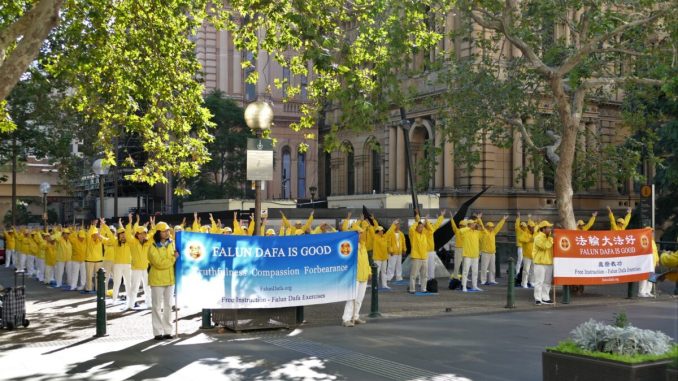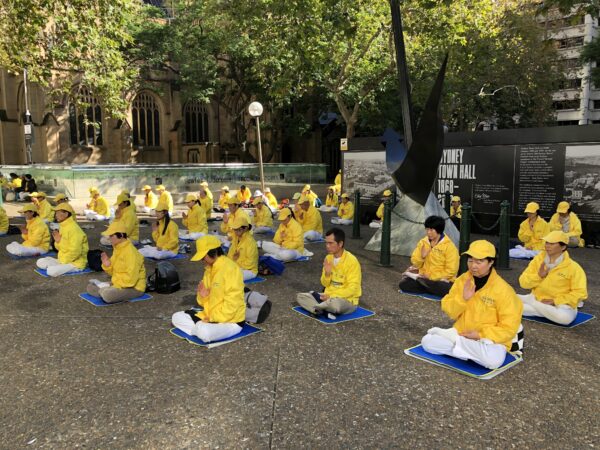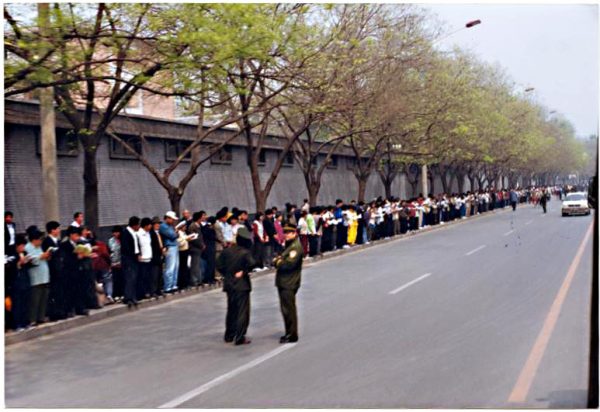
Falun Gong practitioners gathered in Sydney on Saturday to mark the 22nd anniversary of a significant day for the group—the peaceful April 25 appeal at Chinese Communist Party (CCP) headquarters in Beijing.
Out of respect for Anzac Day, the large crowd gathered at Sydney Town Hall a day early to hand out fliers and raise awareness of the appeal that took place outside the State Council’s appeals office in Beijing on April 25, 1999.
On that day, around 10,000 Falun Gong practitioners went to Beijing to appeal for the release of around a dozen practitioners who were wrongfully arrested in Tianjin city days earlier.
Then Premier Zhu Rongji won international acclaim for peacefully responding to the demonstrators by engaging in dialogue with them.
However, this changed overnight when then CCP leader Jiang Zemin overthrew Zhu’s decision and unilaterally initiated what has become one of the longest-running persecutions against people of faith in China.


One Chinese local told The Epoch Times that it was only once she gained unrestricted access to information after arriving in Australia that she learned the CCP had not told the truth about what happened that day 22 years ago.
“It’s after coming to the free world that I began to learn about the April 25 appeal, and [have access to] more detailed material about the persecution of Falun Gong practitioners [in China],” Pan said.
“I didn’t [have the chance to] see all this back in China.”
Pan has been practising Falun Gong, also known as Falun Dafa, for three years. She says she feels “so lucky” to be in Australia where she has “a good environment” to practise due to the country’s values of freedom of religion.

Falun Gong is a spiritual practice from the Buddhist tradition whose adherents follow the principles of truthfulness, compassion, and forbearance. Between 1992 and 1999, the practice grew in popularity with official estimates recording between 70-100 million in China.
The arrests in Tianjin, which sparked the April 25 appeal, came after three years of intense official oppression, in which Falun Gong books were banned from publication, an article smearing Falun Gong had been published in a major state-run newspaper, and the police had begun disrupting group exercise sessions in parks.
For 22 years, details have emerged from China of practitioners suffering beatings, extreme sexual abuse, torture, brainwashing, and even being killed for their organs in concentration camps across China.
For Pan, now that she’s in Australia, she said she takes it as her duty to defy the CCP by going out to clarify the truth about Falun Gong and undo the regime’s lies. She hopes that both the local Chinese community in Sydney and other Australians will learn the truth as well.
‘We Really Salute You’: Human Rights Lawyer
Human rights lawyer Mohammad Moh said he believed everyone has the right to exercise their beliefs without fear of persecution.
He said that he greatly respected Falun Gong practitioners because despite suffering under China’s communist regime, they continued to fight for their freedom.
“I hope one day, sooner or later, they can return back and exercise their freedom in their own motherland, China,” Moh told The Epoch Times.

Moh said he respects Falun Gong practitioners’ courage to continue rallying against the CCP’s persecution despite the risks.
“For us who are watching the movement, we really salute you,” he said. “Our hearts [go] to the victims and their families. We hope justice comes and we see accountability for those who committed such crimes against humanity.”
Another onlooker, Bruce Richmond, told The Epoch Times that Falun Gong “stands for freedom.”
“The people of Australia ought to support these people,” he said, adding that the CCP’s persecution of Falun Gong practitioners, Christians, and Uyghur Muslims was “totally evil.”
“I’m a Christian, and Christians know that atheism, Marxism, and communism is not from God,” Richmond said. “But now, Australians don’t believe in God, or very few, so they are opened to all possibilities and governed by money.”
Falun Dafa Association of Australia spokesperson John Deller wrote in an op-ed for The Epoch Times that the CCP falsely mischaracterised the April 25 appeal after the fact, in the lead up to when Jiang Zemin launched the persecution.
“Not since Tiananmen Square in June 1989 had so many Chinese citizens gathered in public to appeal to the government,” Deller wrote.
“[CCP] officials often claim this was an organised “siege,” falsely alleging that it posed a threat to the nation’s leaders,” he said. “Some western governments and media still refer to the CCP’s narrative as a reason that Falun Gong was banned.”

Li Zhihua, 65, lived in Tianjian when the first practitioners were first arrested.
On April 11, 1999, an academic from the Chinese Academy of Science named He Zuoxiu published an article in the Science Review of Juvenile titled “I Do Not Approve of Youths’ Practice of Falun Gong.” The article repeated defamatory propaganda.
Li went with some local practitioners to the university to ask the publication to retract the statements which they said smeared Falun Gong.
The publication’s editorial board promised to reply the next day, but instead, the Tianjin practitioners were met by hundreds of riot police over the coming days and around 40 were brutally arrested.
The Tianjin government diverted all appeals to the central government in Beijing.
When asked why she has persisted in speaking out for over 20 years, Li simply said: “It’s only three words: ‘Truthfulness, Compassion, Forbearance.’”
“Because this practice is good. It’s not wrong to be a good person.”






Be the first to comment